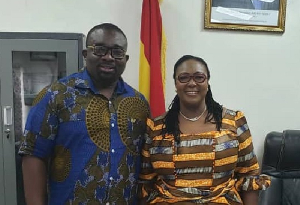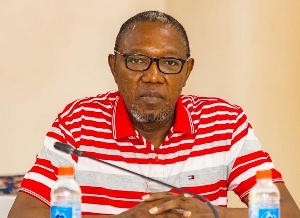Opinions of Friday, 29 September 2023
Columnist: Julius K. Hamenoo
2 SHS students' conversation on politics
FSHS1: Bro, what’s your assessment of the candidates who are offering
themselves up for the flag bearer’s position?
FSHS2: Who wants to know? I am not a delegate. I can’t be bothered about it.
FSHS1: Ei! Hope everything is OK with you. I know you are not a delegate, but I know you’re following the politics of this country. Haven’t you said you will read political science when you get admission into university?
FSHS2: Yes. What has that got to do with delegates of a political party voting to choose their flag bearer?
FSHS1: What are you talking about? The other day, weren’t we debating on the lack of preparedness of most leaders to be tough on their appointees? We both know who the delegates vote for could affect our lives one way or another.
How has it been possible for us to be beneficiaries of the Free Senior High
School system? Don’t forget that our parents couldn’t have afforded our
secondary education had the delegates voted for someone who had a different
vision.
Didn’t we agree that leaders have different visions, and which vision
emerges as the winner matters a lot? Had the delegates not voted for the flag
bearer who had the vision of making secondary education free, would we have
had this opportunity of being graduates of the Free Senior High School system?
FSHS2: Chale! Me, I am even confused, mpo.
They have polluted the atmosphere with so many claims of some people having committed something wrong or illegal that I don’t even know what to think.
FSHS1: Oh yeah. And there’s always some amount of fire under the smoke.
Except that they have to exaggerate their claims to win public sympathy. These
things will always be so. However, we’ve got to focus on the big picture.
FSHS2: I know Paa. But the political atmosphere of this country is
suffocating me. If you give your mind to it, the biases of its advocates could
poison you to become apathetic. I am even considering changing my mind.
FSHS1:What?! Changing your mind? But did you expect everyone to agree
with you?
FSHS2: Of course not.
FSHS1: Then don’t be naïve, my friend. The confusion is throwing me off gear as well. I think this is what should challenge our need to understand the
motivations of the top actors in our politics.
FSHS2: What interests do they show to us apart from vindictive tendencies, character damage, personality attacks, and finger-pointing? These have become the woke culture in most of our politicians. The youth is practically being programmed to repeat the same cycle of talking and doing the same things. And these attitudes have taken us nowhere. Same oo same stuff. I
sometimes wonder if that’s what we are going to inherit after our university
graduation?
FSHS1: Do you believe there’s going to be a change at all? As for me, you
know I’m optimistic. But, don’t overwork yourself with that, bro. We will soon
face out this kind of political brouhaha with a different swag when we storm
into the fray and demonstrate discourses about issues that inform proper
choices.
FSHS2: And who is going to listen to your demonstration of speech? Have they not already tainted our emotions with sentimental nonsense that we no longer have the objective eyes to read in between their propaganda? It’s always the blame game. No one is offering grand ideas to liberate us from our subservient mindset. A mindset that is focused solely on money, money, and money. And because of that, none is prepared to invest in the development of their character, which could ultimately add up to transform the nation.
FSHS1: Oh! Ok. I get it. I understand your indignation. Greed and mediocrity have taken over our sense of purpose and made us easily bent for corruption. We’ve been talking about this quite often. But do you know why political propaganda and populist rhetoric won’t end today?
FSHS2: I don’t remember they taught us the reason in school.
FSHS1: Oh, but they don’t teach everything in school. Most of what we will know about life comes from our curiosity to know. Reading outside
the school curriculum helps, my friend.
FSHS2: And here we are, focusing on getting money more than upgrading
ourselves with salient information, which could make us resourceful in many
conditions.
FSHS1: You see oo!
FSHS2: What point are you trying to make?
FSHS1: There are always new motivations for politicians to spread falsehoods and messages that resonate with emotions more than reasoning. See the number of students that are churned out of school every year? These new entrants into the marketplace are growing by the day too.
FSHS2: The tendency to easily persuade the youth and the inexperienced, I suppose. ‘The Jonny just come like us.’ They sink a hook on a line into our
waters and expect that we would swallow it without verifying the fact, so that
they could fry us in their frying pan for lunch.
FSHS1: Exactly, except that they don’t expect. They know we will
swallow the bait. We are their weakest prey. With no experience and deep
knowledge about life yet, and running into a world wrought with lies to fool the
many and please the few, we are prone to believe their wonderful stories.
Thinking that doing is as easy as saying. It’s only a few of us who know they
could use thirty minutes to explain their fantastic ideas. But as soon as we give them the power to execute those fantastic ideas, they want to use them forever to implement those ideas, which most of us can do.
FSHS2: Yea. Even with forever, they never get to implement long-lasting
solutions to our basic problems. But this issue about the system always churning
out the youth hasn’t crossed my mind. This means at every turn of the year there
will be more youth graduating from schools to seek employment, while very
few workers will be retiring from jobs to go on pension. So, there will always
be a backlog of unemployment and hardship, a legitimate reason for opposition
parties to propagate the unemployment message, hoping to win the hearts of the
unemployed youth. And because the youths are always in the majority, they
capitalize on our gullibility and whip us with emotive propaganda to sway our
minds. I see why you always caution that we watch out for populist messages
instead of grand ideas of change that can transform the country.
FSHS1: Certainly, this is even one of the main reasons. But do you know too that many of these old folks are also as gullible as most of us are?
FSHS2: Really?
FSHS1: Bigtime! They are naïve. Have you noticed the kind of
things that move them to act or not? And the things they derive their sense of
esteem from? Kid stuff. Absolute kids’ stuff. These are the people who have put
a price tag on their integrity and loyalty, not only to the political parties they belong to but to the country they represent. For a small amount of money, they can snitch on the political parties that nurtured them.
FSHS2: How do you mean? How many of them have you examined to come to this wild conclusion?
FSHS1: Oh! By their outward bearing, you can always tell what’s on their
mind. They don’t want to share in the challenges of their political parties. When their party seems unpopular, they are quick to run away like the apostle Peter did to Christ. And when danger looms to confront the fortunes of the party, they easily give up because they feel cheated or strong-armed.
FSHS2: Well, I can understand their weakness of character. Pain is a dreadful thing and no one can endure it for a long time. In the first place, leaders who can’t endure pain aren’t supposed to have occupied leadership positions. Because they don’t know how to transform pain into an opportunity to further their course. Cronies cooked for them in most of the positions they occupied. They didn’t get to the top because of their singular effort. And we cannot trust these types of characters. They don’t understand that the commitment to the values of a worthy course sometimes takes its adherents through thick and thin in the evolution of that course.
FSHS1: That’s exactly my point. Commitment to achieving something grand.
Something out of the ordinary. Something beyond the imagination of the
common people. They don’t admit that our problems emerge from their blindness, if not their inability to stand firm against external coercion. A nation’s growth cannot come from waving a magic wand. A nation grows through steady progress from competent leadership that has a firm focus on its grand vision.
FSHS2: Ok. Agreed. Now, how does this relate to delegates of a political party who are about to vote for their flag bearer?
FSHS1: That’s where it all starts from. But more importantly, when a part of a system you belong to is broken, you don’t abandon it and run away to criticize it. You join forces to fix it and continue with it because you believe in its core values. If you can’t fix it, then let it become a challenge for your leadership to overcome at the local level. It also becomes a precursor to the ultimate challenges you will face when you become the leader of the party one day.
FSHS2: Ok, I am getting your drift. The attitude of those who feel peeved about being neglected by their parties creates the impression that they joined the party because of their gains.
FSHS1: Voila!
FSHS2: Oh, but we felt good as graduates of the Free Senior High School
policy because of that famous social intervention? So, when some people feel
peeved because they think they have been neglected, what’s wrong with that?
FSHS1: Hey, remember, we are not leaders of any political organization. We would be forgiven for not being loyal and committed to party values. We are
merely sympathizers. We are part of the people and the reason leaders ascend
the throne of power. They climb there to make it possible for you and me to
enjoy our basic rights as citizens. That’s what leaders in democratic countries
do. They sacrifice their petty comforts for the citizens to enjoy their freedoms
and liberties, so they can chase after the things that would bring them happiness.
As for the basic amenities, they are necessities that governments build and tax
the people to maintain. The gain of leadership comes from the wellbeing of the
people they preside over, and not from the quantity of money they ought to gain
in their possession. Good leaders feel the pains and also the pleasures of the
people who look up to them, especially if these feelings are perceived to arise
from their stewardship. They suffer with their people and enjoy with them. It is
the gradual transformation of the majority from deplorable conditions into
pleasant ones that marks the success and greatness of leadership. And that is their reward because posterity will always remember them and speak well of them. Good name, the elders have told us, is better than riches, remember?
FSHS2: Yeah. We die and leave behind our riches. But we take along our good deeds. Leaving behind our names for posterity to judge us. Hmm! That’s
understandable. However, these values seem vague to the youths. Besides, no
leader has ever achieved 100% success in changing the lives of their people.
There are always people who will feel left out. And will munch on sour grapes.
FSHS1: It doesn’t mean they should run away from their parties and pitch camp against their parties to disintegrate them. Loyalty matters most. If trust is lost, the option to resign is available to take. You don’t abandon your core principles based on how you feel. You do that through superior reasoning after identifying a false premise that formed part of the pillars of the principles of your party.
FSHS2: Isn’t what you are saying a false premise by itself? They sound like textbook stuff to me. In our society today, money is the sole motivating factor in all our endeavors. It is all about money. Even the church, which is supposed to work on our souls, sells Jesus to make money to get along. How many more politicians operate from the base of their lower self?
FSHS1: Aha! Now we are coming to the crux of my concern. You’ve hammered the nail heavily on its head. From where I look at it, politics evolved from the canker that crept into the church and spread when religion decayed into the killing of neighbors to proselyte them. Religion and politics may look different, but they are twins from the same womb.
However, politics is meant to bring the people together and use their togetherness to harness opportunities for their collective benefit. When religion was busily dividing us into sects, and killing us because we didn’t belong, politics came in to bring us together and provide for all. The important thing was to maintain a steady and stable progress of the community and the people in it. The state has no point of destination; it develops and progresses toward peace, stability, and prosperity for all. Creating an enabling environment for its citizens to pursue their happiness. The state makes it possible for its citizens to enjoy a conducive environment to plan their future lives.
FSHS2: I see. But this thing we call democracy seems to be the blot where
most of our problems are coming from. It has now assumed what the church
was doing in the past. Divided us into schisms in the past, and into political
ideologues today. It has allowed different ideologies to divide the people once
again into different political groups based on ideas the people don’t even
understand. In our part of the world, we still want to use the construct of
colonial schemes, which used tribal and religious bias to divide us so they could control us, as part of our campaign strategies.
FSHS1: Correct. It has now concentrated its power not in the thumbs of the people but in the hands of a small group of individuals who typically possess significant wealth, influence, or political connections to exert control over political, social, or economic institutions. And like we talked about yesterday, those with money end up controlling our economy much more than the adroit politicians we would want to vote for.
FSHS2: So, the whole thing is now gradually evolving from the influence of ideology, tribe, and religion to the influence of a few groups of people who have money and power.
FSHS1: Exactly! And to serve their financiers. This has been possible because wealth plays a dominant or controlling role in governance, policymaking, or societal influence. We all know the role money plays in our society. They have gradually forced our democracy to stoop in front of oligarchs and plutocrats who have merged to conspire against the people.
FSHS2:,/b> It actually seems so. See the role money plays in electing flag-bearers of political parties?
FSHS1: That’s why I was asking for your opinion about the upcoming delegate election.
FAHS2: The delegates call this event their cocoa season.
FSHS1/FSHS2: Hahaha ha-ha!
FSHS2: They get their thumbs swayed to print on the ballot of the highest bidder instead of the one who has what it takes to stay committed to the progressive cause. To think these delegates would ultimately impose a candidate on us to vote for as the President of our country.
FSHS1: Aha! Now you are speaking my language. See why we ought to be
concerned about politics?
FSHS2: And it all starts from the base. The people they elected as executives of polling stations, electoral areas, constituencies, and regions become the delegates that ultimately determine who becomes the country’s President if the propaganda machine works well for that person. A decision made by a few selected members of the political party they belong. Most, if not all, of whom would have been financed by top brass politicians nurturing the ambition to lead one day.
FSHS1: Good. They put them in places where they could count on their support in the future. And this is usually done by those with deep pockets. And those with deep pockets usually have links and connections with other deeper pockets that finance them.
FSHS2: So, we don’t get to exercise our true democratic franchise based on merit?
FSHS1: Merit indeed. Merit doesn’t count. They don’t consider merit in this type of environment. Who we vote for is always determined by the expenditure of fortune from unknown sources. These subterranean financiers impose their candidate on the delegates and whip them with money and populist sentiments to vote for him. Meanwhile, they would have used the media to polish and project the image of that personality with decorative words for the masses to accept him as if they knew him well. Now, the social media is the platform they get us through. And when he wins and assumes the Office of the President, no sooner has he sat in his chair than his financiers would have overwhelmed him
with payback demands. That’s why they usually become gray or bald in no
time, even when they are young.
FSHS2: Haha haha! I see where you are steering this to. It’s never occurred to me you are still worked up over this delegate voting that’s coming up. When I think about it, this kind of democracy sucks. If the party in power believes it has done well, and because of that, it wants to ask the people to keep it in power, why is it risking contesting the one who has given them the reason to want to continue?
FSHS1: Aha! Do you see the irony of being more democratic than those who
brought it to us? Is it not an indictment of the performance of the one whose
performance is the basis of their wanting to break the cycle? If he loses, whose
legacy is the winner going to draw on to campaign?
FSHS2:/b> See oo! I haven’t thought about it this way. They are practically
creating the chance for those with sour grapes in their mouths to swing negative
blows at them. Then they would have shot themselves in the foot.
FSHS1: In the foot would have been ok? But it looks like they are aiming at
their head. Trying hard to prove to the masses that what the opposition has been
saying about their leadership is true.
FHSS1/FSHS2: Hahaha haha.
Entertainment












